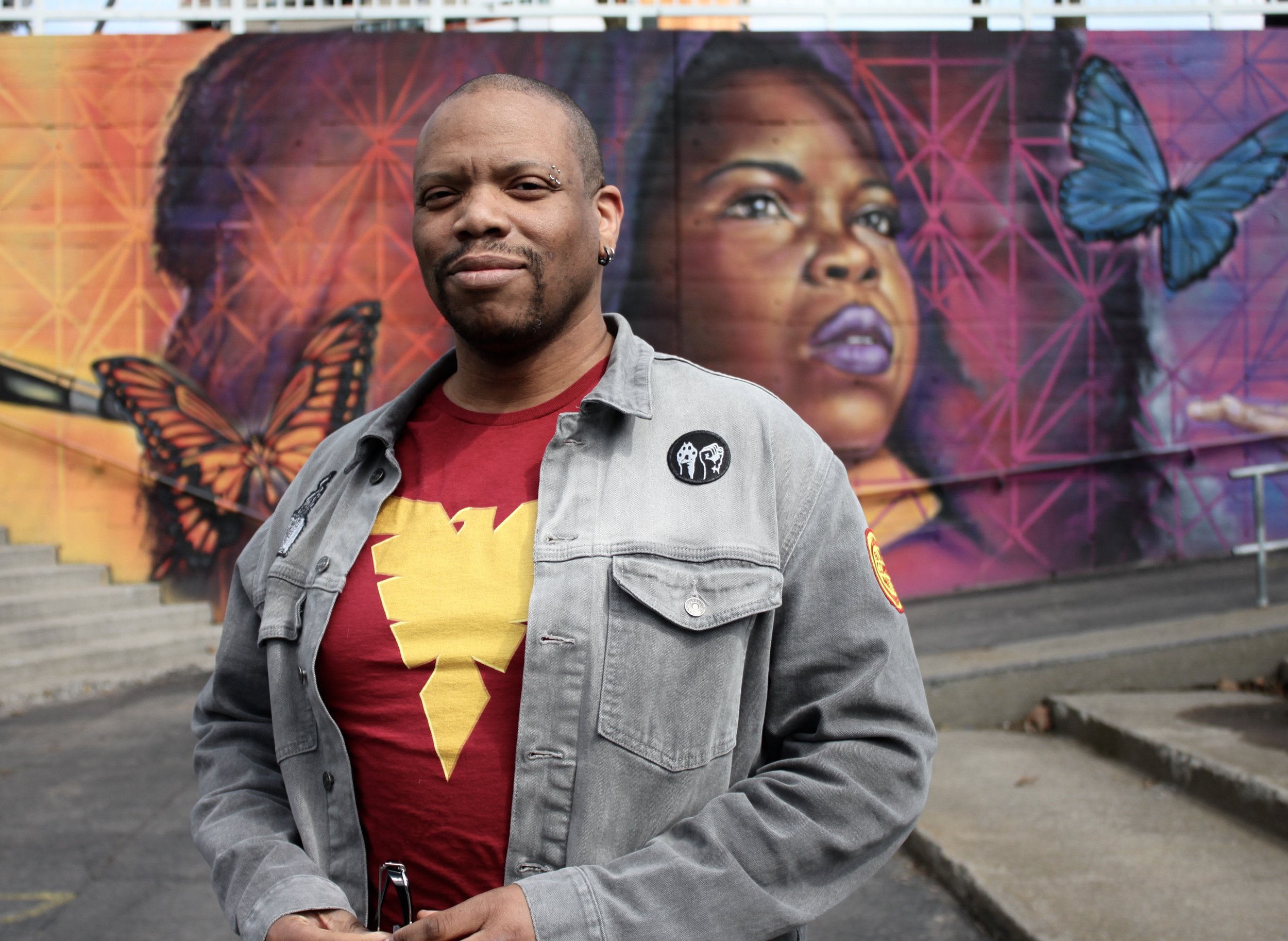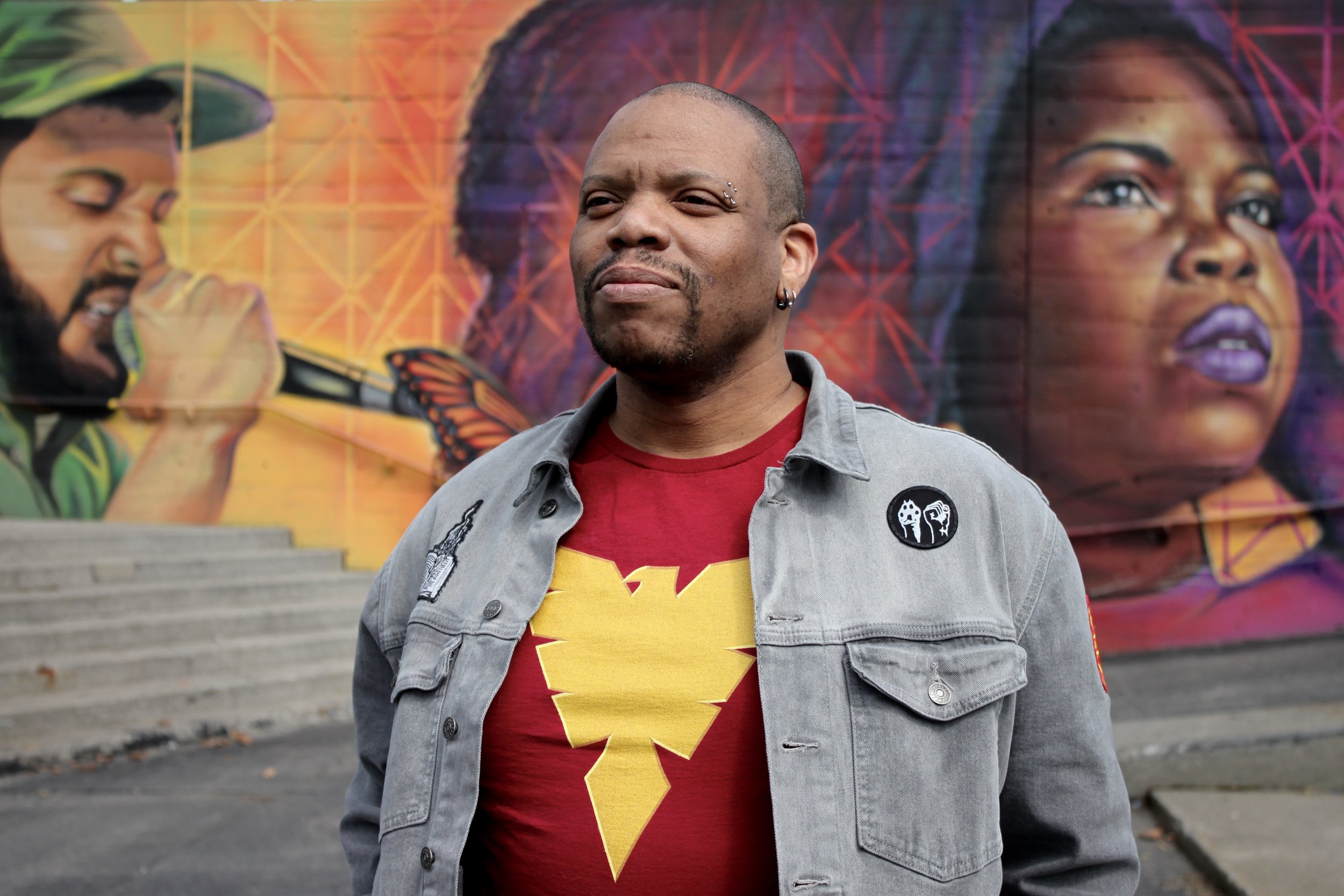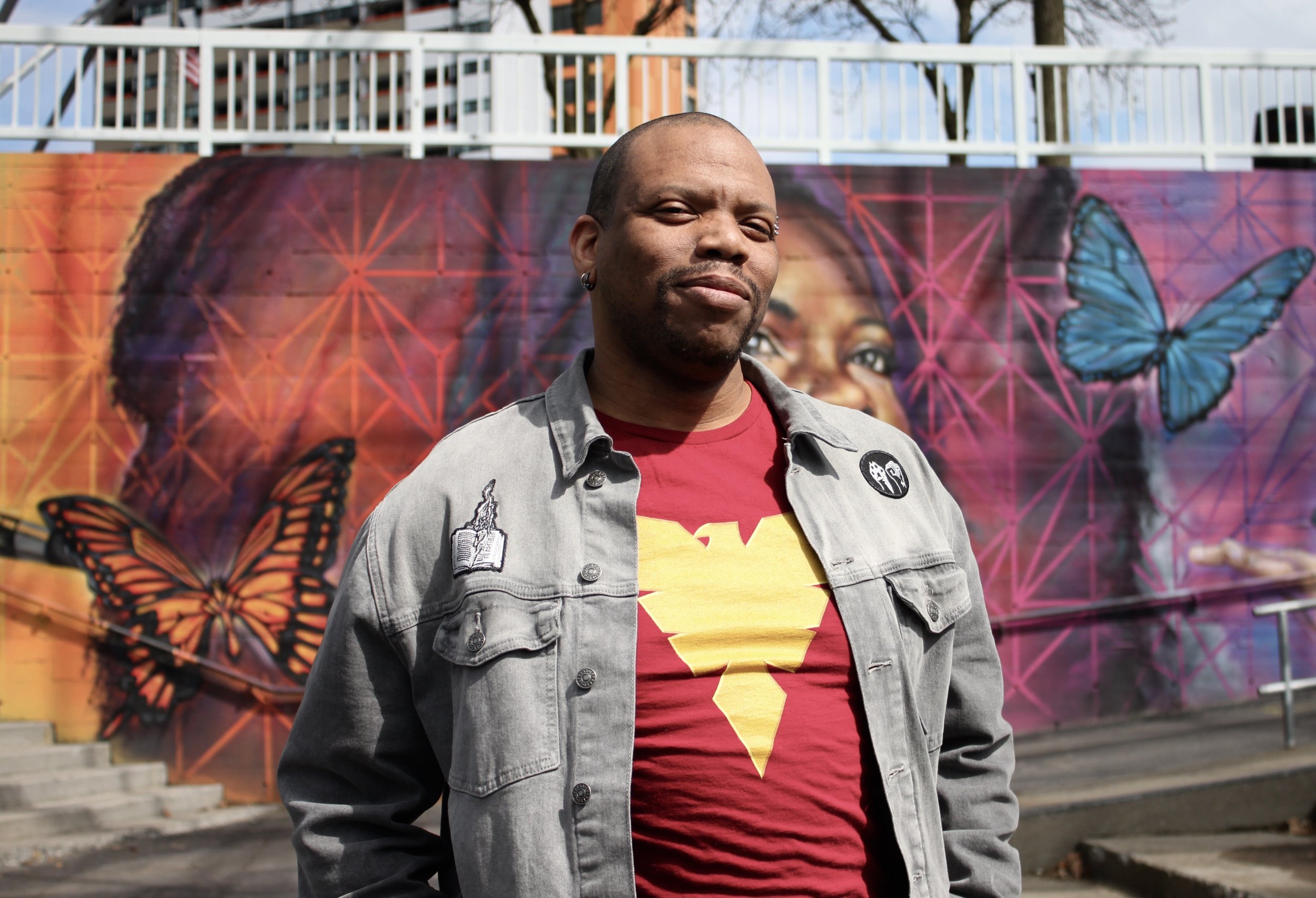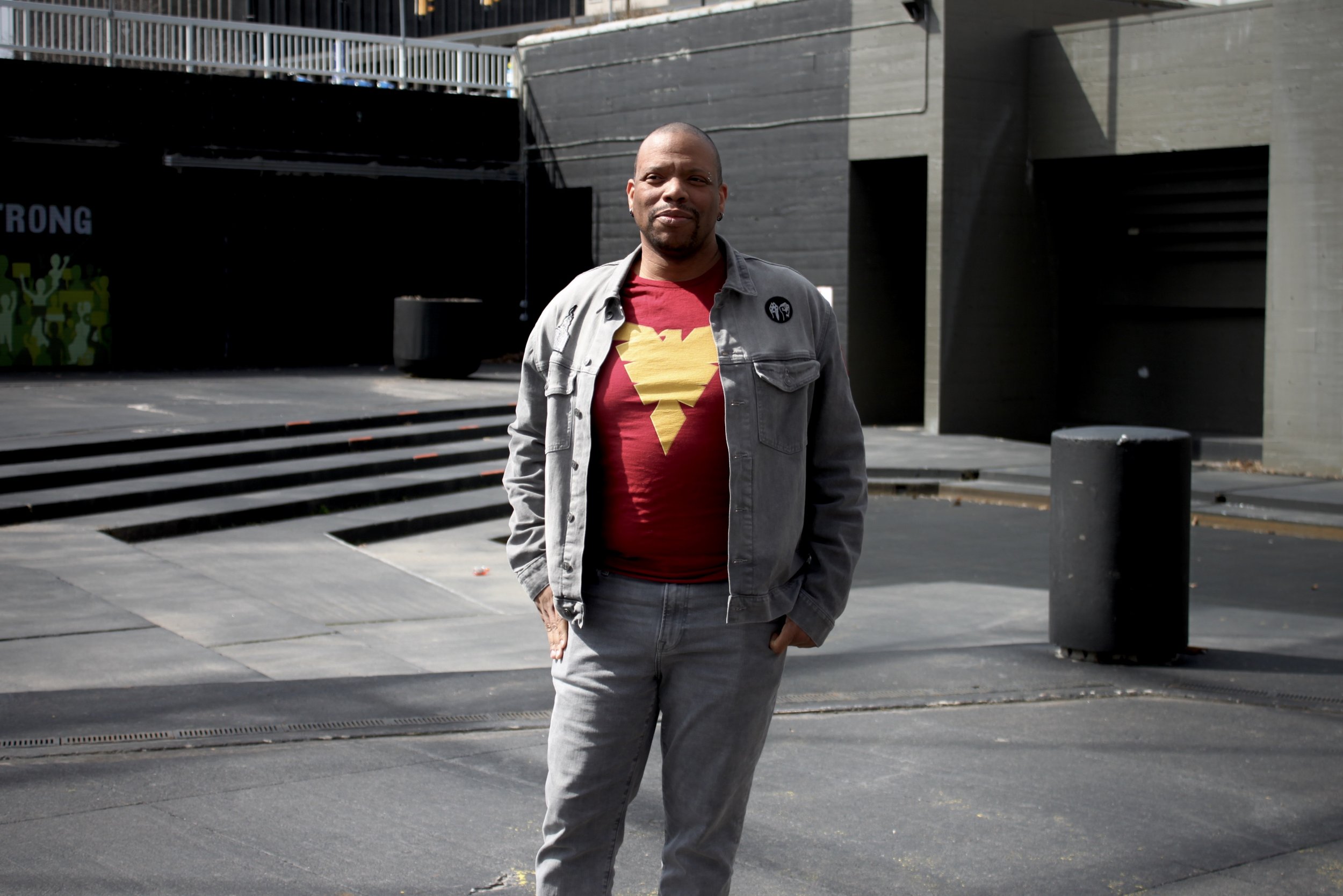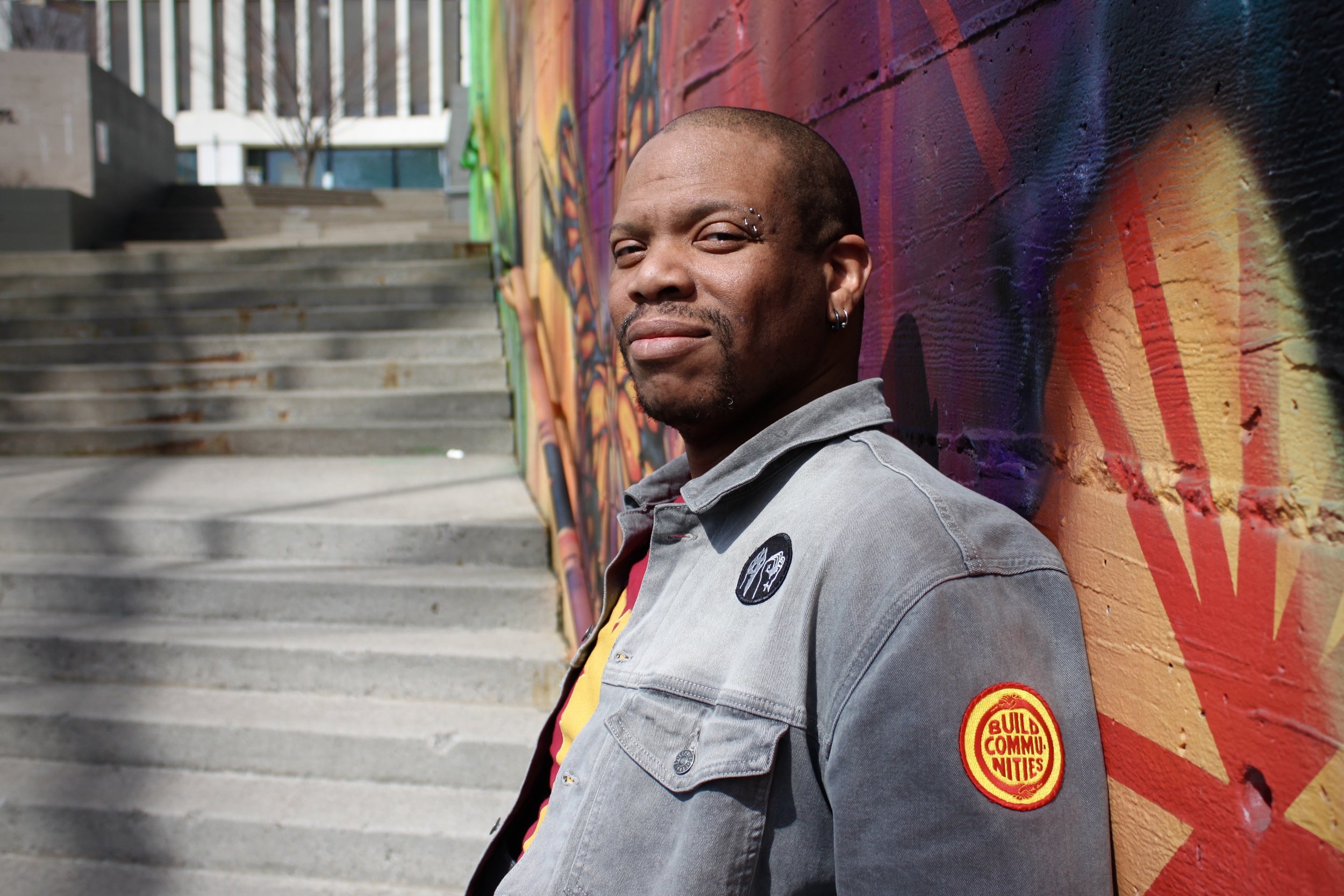Chris Thompson
“I am not sure if I’ve healed, but I have managed, and the things that used to stop me in my tracks no longer debilitate me the way they used to when I was young. I suppose that is a type of recovery… I think a true, full recovery for me would be to be able to remember and talk about all the things that happened in my life that wounded me in the past.”
NAMI: Have you ever had any mental health struggles?
CT: I definitely had mental health struggles throughout my life, but I didn’t have words to describe them until now. I was a very anxious child, to the point that my anxiety would freeze me up from doing anything, like those goats that freeze up when they get too excited. My elementary and middle school were spent in a rural county where I was the only Black child in the school district, and there was an active KKK chapter. I got bullied a lot. I had a bad experience with a child psychologist/therapist that turned me off from getting any type of therapy. It wasn’t until we had moved to Baltimore and I was a teenager that I was diagnosed with depression, about a year into being homeless. I also had suicidal ideations around that time. There wasn’t much I could do about treating it because we were destitute, and even seeing a regular therapist cost too much money. My “dealing with it” was burying my nose in my school work.
NAMI: If you have had struggles, how have you healed and grown from your experiences? If you consider yourself in recovery from something, what does recovery mean to you?
CT: I am not sure if I’ve healed, but I have managed, and the things that used to stop me in my tracks no longer debilitate me the way they used to when I was young. I suppose that is a type of recovery. Now I usually recognize when I’m starting to spiral into a depressive funk and focus appropriately. Even during the pandemic when I was quarantining alone, I could tell that a depression cloud was looming. I don’t get anxious at all, save for extenuating circumstances. I no longer catastrophize every situation, thereby making it worse. I’m able to step back, take a breath, and do my best to handle obstacles as I come up to them. I think a true, full recovery for me would be to be able to remember and talk about all the things that happened in my life that wounded me in the past.
NAMI: You’ve written about racial injustice for 540 W Main and CITY Newspaper. In one article, you recount the story of being violently accosted by a Baltimore police officer on your walk to the bus stop as a minor, because the officer thought you had drugs in your backpack (you didn’t). How have race-based stress and traumatic experiences like these impacted your mental health?
CT: I definitely have a disdain and distrust for authority. I feel myself getting simultaneously angry and nervous and helpless, because all of my experiences with American police have shown me that no matter where they are, they can pretty much do whatever they want to me with impunity. No matter how “friendly” an officer is, I am on edge when I am in close proximity to them. I will likely never trust an American police officer, no matter how good their intentions may be. In my defense, I have never had a good experience with a cop. When I was young in the rural county, a sheriff made it his mission to terrorize my mother and our family. He would visit the house on a regular basis and make up reasons to arrest her or impound her car. I found out later that he did much worse stuff to her. In Baltimore, the police would harass us while we were at the bus stop waiting for our bus to head to school. One time, I had a cut and a knot on my head and had to go to school like that. I lied and said I ran into a branch. I was arrested for disorderly conduct when I was 19, when a Baltimore County cop maced an 8-year-old in order to disperse a crowd in front of a skating rink. I was in my friend’s car, visibly upset, and suddenly a large hand grabbed me out of the car and I was slammed to the ground and in handcuffs. My introduction to Rochester police was my first week in town, when a patrol car tailed me for almost two miles to my destination (Downtown St. Paul St. for some dinner). The officer finally threw on his lights and pulled me over and accused me of swapping the VIN on my car for another. I had no idea what he was talking about.
CT: It is not just the police, though. My first experience with racism was in preschool when I had to ask my mother what a “[n-word]” is, because a kid said I couldn’t wear a Superman shirt because I am one. I was an easy, visible target for bullying, which happened a lot. When I graduated as an engineer, and got a job immediately out of college, many colleagues could not fathom that I have a Bachelor of Science and did not have some military service employment waiver. For a while, I dressed up more than the other college hires, because I kept being mistaken for a custodian. It was strange, because I was being paid a higher salary than all the other college hires, and I was ranking higher in all my performance reviews. Despite that, I would always have a nagging feeling about how I got a job, even when I was overqualified. I would second-guess myself constantly. It wasn’t until my current job that I feel like I’m truly being judged on my merit. That is freeing.
NAMI: What forms of mental health-related stigma have you run into? How do you combat stigma? Do you feel like a shift is happening, and if so, what is evidence of that shift?
CT: I was raised in a Black Methodist household, and therapy and mental health was usually left to prayer, despite the fact that my mother has a state-issued therapist and was on various antidepressants as far back as I can remember. We were not to speak about that in public, though. My whole family was tight lipped about any mental health issues, and the church did not help. One of our pastors flat out said that depression is a “sin”. So even when I was down, I would pretend that everything was fine, at least on Sundays. It is much easier to be candid about mental health issues today. After my divorce, I was a lot more upfront about everything in my life. I laid out everything on the table. I’m sure it helped that this was around 2008, so culturally it was less taboo to discuss mental health. I’m not sure why the taboo lifted, but I think a major factor was mental health being covered in insurance plans. The cost that made it inaccessible in my youth was now readily available for a nominal fee in my adulthood.
NAMI: How do you protect your mental health? What forms of self-care do you practice? What keeps you balanced?
CT: I’m honestly not sure if I’m protecting my mental health that well. I meditate and read and cut down on screen time and other stuff that people say you should do, but I don’t have a regular regimen for my mind. It helps that I have a diverse friend network. My self-care is probably studying/training capoeira. I’ve been doing that for 14 years, and it exhilarates me even on bad days. It is likely the exercise aspect plus the history aspect that keep me level. Maybe it’s dedicating myself to something and sharing it with others. I feel more balanced when I’m teaching and learning.
NAMI: Do you feel like you have enough mental health support or is it challenging to find accessible and affordable treatment/therapy, etc.? Are there local resources you’ve used that you would recommend?
CT: It is a little bit difficult to find a therapist in Rochester. Some don’t take insurance, but some are just too booked up to take on new patients. The other obstacle is finding a therapist that identifies with you. I would prefer a therapist that has had similar life experiences to mine. That was nearly impossible to find when I was young. Today is a little bit easier. BetterHelp is a decent choice, despite it being online.

